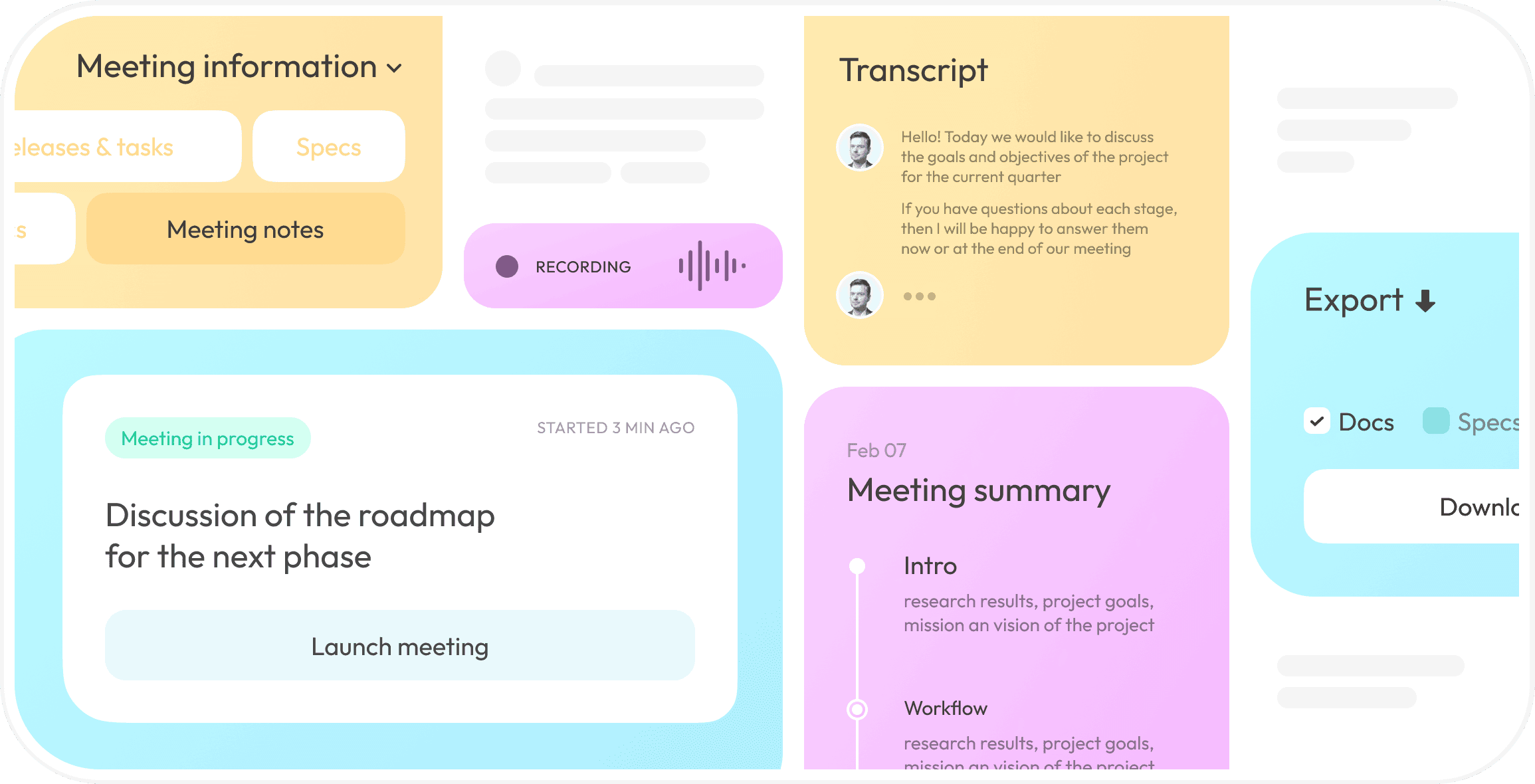Jun 13, 2023
Top 5 reasons to record meetings during the development process
Insights
Process
Jun 13, 2023


The development process usually lasts for the entire lifecycle of a product. During this time, many things can happen, for example: replacements of team members, pivoting, radical complications of product functionality.
How can you make sure that product development doesn't lose efficiency and that everyone involved in the project is aware of the details? Here is one way to make negotiations more efficient. It is to record all regular meetings of the development team with the customer, transcribing them and making them searchable.
Reason 1. Efficiency without any losses
The concept of efficiency is built on maximum engagement in a task. But people are not robots, and it is difficult for them to give 100% of their attention. Especially if the workday involves five call-outs or several major projects at the same time. Sometimes an employee can get distracted for personal reasons or lose track of a conversation during a meeting. In this case, recording is an opportunity to replay the moment.
There are people with a remarkably monotonous voice. Their speech automatically becomes white noise, and then five minutes later you realize that you haven't heard anything, you've flown off into your own thoughts. Well, sometimes it happens that way. But with a recording I can be sure that at the right moment I will simply go back to that meeting and find out everything.
Angelina Shkonda, Loovatech systems analyst
Reason 2. Updating data at any time
At the start of a project, a contractor receives a huge amount of introductory documentation. Among the numbers and official words, you often cannot find the main thing - the customer's pains and problems. But it is on identifying the problem and discussing how to solve it that the entire project stands. The tone, the excitement, the anger, the concern - these are the fulcrums that can help prioritize. It also happens that a lot of time passes before the actual launch of the project (budget negotiation, fundraising, etc.). At the same time, project discussions, exchange of ideas and formalization of requirements do not stop. To avoid wasting many hours of the team's time on repeated discussions, it is enough to listen to the right pieces. Recording the meeting is a way not to miss any important detail.

Reason 3. Painless inclusion of new employees in the project
We rarely see projects that are implemented by the same people from start to finish. People leave or decide to work on other projects. Sometimes the project grows and the development team expands. When a new member joins the team, it is important to properly immerse him or her in the project without losing context and detail. Important meetings recordings, along with other project documentation, help the newcomer to learn more about the project, the clients, milestones, mistakes and successes of the project. This approach speeds up his or her adoption, reduces the team's hours spent on re-explaining and ultimately saves the customer’s money.
Reason 4. The call makes the transcript of the meeting
Recording allows the project manager to listen to and participate in the conversation. The formulation of transcript and tasks takes place after the call. Additionally, it is not always clear in advance where the conversation will go in the meeting. It is not rational to invite the whole team to every call. But with all the recordings, an interested employee can find and listen to the relevant parts of the meeting and understand the task better.
Reason 5. Decreasing the binding to the contractor
When you change contractors, you almost always have to start all over and explain everything about the project to the other team from the beginning. This is complicated and time consuming. If you have records of the meetings, you can upload an archive of them and attach them to your project documentation. This way the new team can find answers to questions about the project faster by listening to key meetings point by point and to become more effective in the early stages of working with the customer.
The development process usually lasts for the entire lifecycle of a product. During this time, many things can happen, for example: replacements of team members, pivoting, radical complications of product functionality.
How can you make sure that product development doesn't lose efficiency and that everyone involved in the project is aware of the details? Here is one way to make negotiations more efficient. It is to record all regular meetings of the development team with the customer, transcribing them and making them searchable.
Reason 1. Efficiency without any losses
The concept of efficiency is built on maximum engagement in a task. But people are not robots, and it is difficult for them to give 100% of their attention. Especially if the workday involves five call-outs or several major projects at the same time. Sometimes an employee can get distracted for personal reasons or lose track of a conversation during a meeting. In this case, recording is an opportunity to replay the moment.
There are people with a remarkably monotonous voice. Their speech automatically becomes white noise, and then five minutes later you realize that you haven't heard anything, you've flown off into your own thoughts. Well, sometimes it happens that way. But with a recording I can be sure that at the right moment I will simply go back to that meeting and find out everything.
Angelina Shkonda, Loovatech systems analyst
Reason 2. Updating data at any time
At the start of a project, a contractor receives a huge amount of introductory documentation. Among the numbers and official words, you often cannot find the main thing - the customer's pains and problems. But it is on identifying the problem and discussing how to solve it that the entire project stands. The tone, the excitement, the anger, the concern - these are the fulcrums that can help prioritize. It also happens that a lot of time passes before the actual launch of the project (budget negotiation, fundraising, etc.). At the same time, project discussions, exchange of ideas and formalization of requirements do not stop. To avoid wasting many hours of the team's time on repeated discussions, it is enough to listen to the right pieces. Recording the meeting is a way not to miss any important detail.

Reason 3. Painless inclusion of new employees in the project
We rarely see projects that are implemented by the same people from start to finish. People leave or decide to work on other projects. Sometimes the project grows and the development team expands. When a new member joins the team, it is important to properly immerse him or her in the project without losing context and detail. Important meetings recordings, along with other project documentation, help the newcomer to learn more about the project, the clients, milestones, mistakes and successes of the project. This approach speeds up his or her adoption, reduces the team's hours spent on re-explaining and ultimately saves the customer’s money.
Reason 4. The call makes the transcript of the meeting
Recording allows the project manager to listen to and participate in the conversation. The formulation of transcript and tasks takes place after the call. Additionally, it is not always clear in advance where the conversation will go in the meeting. It is not rational to invite the whole team to every call. But with all the recordings, an interested employee can find and listen to the relevant parts of the meeting and understand the task better.
Reason 5. Decreasing the binding to the contractor
When you change contractors, you almost always have to start all over and explain everything about the project to the other team from the beginning. This is complicated and time consuming. If you have records of the meetings, you can upload an archive of them and attach them to your project documentation. This way the new team can find answers to questions about the project faster by listening to key meetings point by point and to become more effective in the early stages of working with the customer.
The development process usually lasts for the entire lifecycle of a product. During this time, many things can happen, for example: replacements of team members, pivoting, radical complications of product functionality.
How can you make sure that product development doesn't lose efficiency and that everyone involved in the project is aware of the details? Here is one way to make negotiations more efficient. It is to record all regular meetings of the development team with the customer, transcribing them and making them searchable.
Reason 1. Efficiency without any losses
The concept of efficiency is built on maximum engagement in a task. But people are not robots, and it is difficult for them to give 100% of their attention. Especially if the workday involves five call-outs or several major projects at the same time. Sometimes an employee can get distracted for personal reasons or lose track of a conversation during a meeting. In this case, recording is an opportunity to replay the moment.
There are people with a remarkably monotonous voice. Their speech automatically becomes white noise, and then five minutes later you realize that you haven't heard anything, you've flown off into your own thoughts. Well, sometimes it happens that way. But with a recording I can be sure that at the right moment I will simply go back to that meeting and find out everything.
Angelina Shkonda, Loovatech systems analyst
Reason 2. Updating data at any time
At the start of a project, a contractor receives a huge amount of introductory documentation. Among the numbers and official words, you often cannot find the main thing - the customer's pains and problems. But it is on identifying the problem and discussing how to solve it that the entire project stands. The tone, the excitement, the anger, the concern - these are the fulcrums that can help prioritize. It also happens that a lot of time passes before the actual launch of the project (budget negotiation, fundraising, etc.). At the same time, project discussions, exchange of ideas and formalization of requirements do not stop. To avoid wasting many hours of the team's time on repeated discussions, it is enough to listen to the right pieces. Recording the meeting is a way not to miss any important detail.

Reason 3. Painless inclusion of new employees in the project
We rarely see projects that are implemented by the same people from start to finish. People leave or decide to work on other projects. Sometimes the project grows and the development team expands. When a new member joins the team, it is important to properly immerse him or her in the project without losing context and detail. Important meetings recordings, along with other project documentation, help the newcomer to learn more about the project, the clients, milestones, mistakes and successes of the project. This approach speeds up his or her adoption, reduces the team's hours spent on re-explaining and ultimately saves the customer’s money.
Reason 4. The call makes the transcript of the meeting
Recording allows the project manager to listen to and participate in the conversation. The formulation of transcript and tasks takes place after the call. Additionally, it is not always clear in advance where the conversation will go in the meeting. It is not rational to invite the whole team to every call. But with all the recordings, an interested employee can find and listen to the relevant parts of the meeting and understand the task better.
Reason 5. Decreasing the binding to the contractor
When you change contractors, you almost always have to start all over and explain everything about the project to the other team from the beginning. This is complicated and time consuming. If you have records of the meetings, you can upload an archive of them and attach them to your project documentation. This way the new team can find answers to questions about the project faster by listening to key meetings point by point and to become more effective in the early stages of working with the customer.
let's talk
book a 30-minute call to get feedback and a budget estimate from our expert team
let's talk
book a 30-minute call to get feedback and a budget estimate from our expert team
let's talk
book a 30-minute call to get feedback and a budget estimate from our expert team
our address
Tornimäe, 5 10145 Tallinn Estonia
contact us


our address
Tornimäe, 5 10145 Tallinn Estonia
contact us


our address
Tornimäe, 5 10145 Tallinn Estonia
contact us

